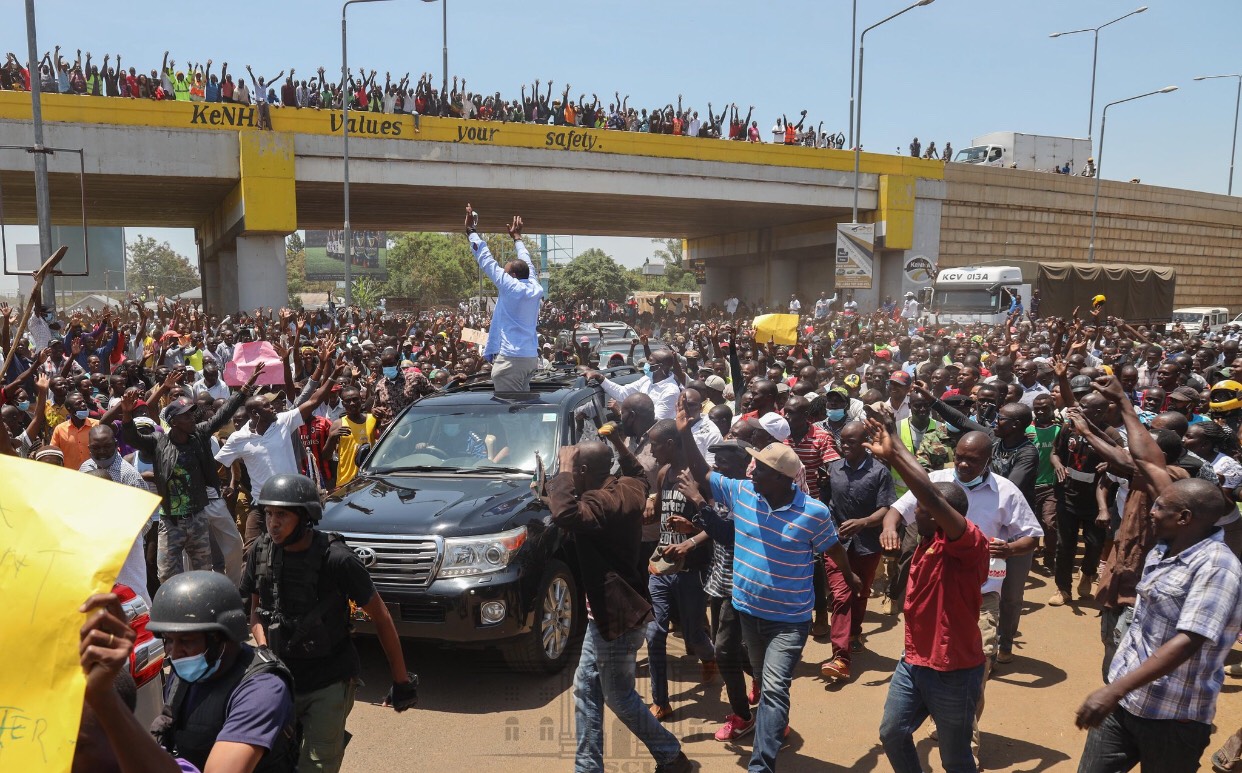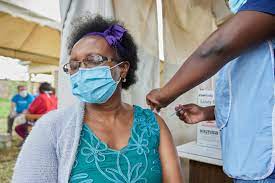Share this
A patient coughs violently, turning from side to side. Another is sitting still on the bed, an oxygen mask on his face. He seems to be barely conscious. A nurse sighs… “Ei, Covid is too much,” she says. She is wearing multiple face masks, a white N95 mask at the front.
The camera pans across the Covid-19 isolation ward in Kisumu. Long shot images of patients. All the beds are occupied. The patient at the front has an oxygen tube in her nose. A woman seemingly in her mid-50s.
“I have seen seven people die by my side, and you think that the next minute you are also going,” says a gentleman in a white vest. He is seated on his bed, he seems to be recovering. His worst nightmare passed. From his facial expression, he looks relieved.
These are images from an NTV feature promo titled “Fighting for Breath,” which airs tomorrow evening. They are chilling. They tell the story of a struggling healthcare system in a city that has become the latest epicentre of Kenya’s Covid-19 pandemic.
These images as chilling as they are, only tell half the story. A quick scan through social media pages will give you the impression of a city in mourning. Everyone is losing someone to the pandemic. The numbers are no longer statistics but names and faces we know.
“Two of my close friends just lost their beloved parents to Covid-19 today. The situation in Kisumu regarding the pandemic is worse than we know or we are told,” writes Vic Mabeya in a Facebook post.
How did Kisumu get here?
There are many explanations for this, but allow me to tell you what role your favourite politician played…either by acts of omission or commission.
Wastage of Covid-19 funds
It is regrettable that almost a year and a half since the pandemic started, Kisumu does not have enough isolation beds for Covid-19 patients. There are reports of critically ill patients being turned away from public hospitals, while private hospitals charge an average of KES 300,000 before they can admit any patient. Worse, Covid-19 is not covered by normal health insurance.
While counties received funds in April 2020 to prepare for an upsurge in infections, most of these funds were misused. A report by the Auditor General indicted counties for mismanaging KES 13.8 billion of the monies allocated to them for fighting the pandemic.
All the 47 counties (including Kisumu) awarded private firms contracts to purchase medical items without following public procurement procedures. The report also cites cases where senior county officials gave contracts to their associates without in clear contravention of procurement regulations.
Most of these counties bought overpriced items, wasting funds that could have been of much help today.
Doublespeak
Politicians in their usual sense are the masters of double-speak. This pandemic has just highlighted that. While in podiums they castigate Kenyans for not treating the pandemic seriously, in action they have promoted the same disregard for the pandemic.
Not even the death of a couple of members of parliament and the near-brush with death for others seem to influence a change of heart.
It is quite interesting that none other than the President himself indicted the country’s politicians, including himself for their role in spreading the virus.
Speaking in October last year at the heart of the second wave of Kenya’s pandemic, President Uhuru Kenyatta singled out politicians – including himself for their role in getting the country where it was.
“In October only, we have had over 15 000 new cases of corona infections and approximately 300 deaths according to the national multi-agency command centre on Covid- 19,” he said.
Different rules
He attributed the rise in infections at the time to increased political activities in the country. These were mainly rallies in support or opposition to the push to amend the country’s constitution through the BBI process. Politicians from across the political divide used every opportunity to gather crowds by the roadside or during government events and drummed their narratives to jubilant supporters, most of whom were neither wearing masks or exercising any form of social distancing.
This was the case in Kisumu in October 2020 when the President and former Prime Minister, Raila Odinga, addressed two huge rallies in Kisumu. What followed was weeks of increased infections in the lakeside city.
While on paper political gatherings and large burials are prohibited, this rule seems to only apply to a section of the political class. We have witnessed large campaigns across the country, especially during by-elections.
We have seen large funeral gatherings held for politicians, and their relatives. A case in point was the burial to the mother of ANC Leader Musalia Mudavadi. An event attended by almost the entire political class in this country. It’s was however not just them, thousands of mourners also attended.
The former Prime Minister who is at the helm of the constitutional change bid was until early this year crisscrossing the country with his BBI gospel. Before he was himself hospitalized after testing positive for the virus, he was holding rallies, conferences and so on. At times appearing in public not wearing a face mask.
The Deputy President while appearing to be avoiding public rallies has held events at his Karen home, inviting hundreds of youths at a time.
Madaraka Day in Kisumu
Most recently during the Madaraka day celebrations in Kisumu, thousands gathered at the Jomo Kenyatta stadium. Even though they had face masks that were being given to all for free, very few seemed to be wearing them correctly – effectively beating the purpose. This event was held in Kisumu despite rising cases of infections; most attributed to the Indian variant.
On their way from the stadium, politicians got out of their vehicles to acknowledge greetings from supporters.
Medics are currently warning that the next two weeks will be critical in Kisumu.
Other than directly providing avenues for a surge in the spread of the virus, many people look up to politicians for leadership. When the government advises the citizens to take precautions but act in a contrary way, many tend to doubt the seriousness of the pandemic. Especially at a time when social media is also rife with conspiracies.
It’s therefore not surprising to see members of the public locking themselves up in bars to drink in clear disregard to laid down containment protocols. You can’t blame them.





